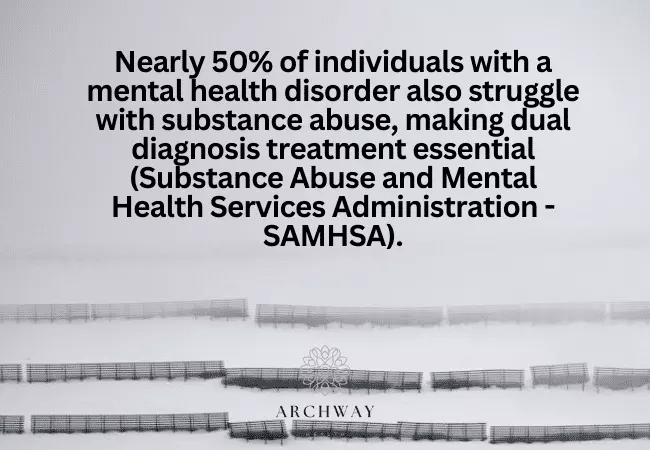Substance abuse and mental health disorders often go hand in hand, creating a complex cycle that can be difficult to break without professional support. Studies show that nearly 50% of individuals with a mental health disorder also struggle with substance abuse, a condition known as co-occurring disorders or dual diagnosis (Substance Abuse and Mental Health Services Administration – SAMHSA). Without integrated treatment that addresses both conditions simultaneously, individuals may find themselves stuck in a recurring pattern of relapse and emotional distress.
At Archway Behavioral Health, we provide comprehensive, evidence-based treatment programs designed to support individuals struggling with both substance use disorders and mental health challenges. Our approach combines Cognitive Behavioral Therapy (CBT), Dialectical Behavioral Therapy (DBT), Individual Therapy, Group Therapy, and specialized treatment programs to ensure that clients receive the holistic care they need for long-term recovery.
This guide explores:
- The connection between substance abuse and mental health disorders
- Common co-occurring disorders and their effects
- Why integrated treatment is essential for lasting recovery
- Evidence-based therapies used in dual diagnosis treatment
- How to access professional help at Archway Behavioral Health
The Link Between Substance Abuse and Mental Health Disorders
Mental health disorders and substance abuse often develop together due to their interconnected nature. Individuals may turn to substances as a way to self-medicate and relieve distressing symptoms, but substance use can also worsen mental health conditions, leading to a dangerous cycle of dependence and emotional instability.
How Substance Abuse Affects Mental Health:
- Increased risk of anxiety and depression due to chemical imbalances in the brain.
- Greater emotional instability caused by substance-induced mood swings.
- Higher risk of developing PTSD and trauma-related symptoms, especially in individuals with a history of abuse or neglect.
- Cognitive impairments and memory issues that make it harder to engage in therapy and recovery.
How Mental Health Disorders Contribute to Substance Abuse:
- Self-medication with drugs or alcohol to cope with anxiety, depression, or PTSD.
- Increased impulsivity and risk-taking behaviors due to untreated bipolar disorder or emotional dysregulation.
- Social isolation and hopelessness leading to reliance on substances for emotional escape.
- Difficulty maintaining motivation for recovery due to untreated symptoms of depression.
Without integrated care that treats both conditions, individuals are more likely to relapse and struggle with long-term recovery.
Common Co-Occurring Disorders and Their Effects
Co-occurring disorders can take many forms, with each individual experiencing unique challenges. Some of the most common combinations include:
1. Anxiety Disorders and Substance Abuse
Many individuals with generalized anxiety disorder (GAD), panic disorder, or social anxiety turn to alcohol or drugs to calm their nerves. However, substance use can worsen anxiety symptoms over time, leading to higher dependence and withdrawal-related panic attacks.
2. Depression and Alcohol Use Disorder
Alcohol is a depressant that intensifies symptoms of major depressive disorder, increasing the risk of suicidal thoughts and emotional numbness. Many individuals find that alcohol provides temporary relief, but long-term use deepens depression and worsens motivation for recovery.
3. PTSD and Opioid Addiction
Post-Traumatic Stress Disorder (PTSD) often leads individuals to seek escape through opioids or other pain-relieving substances. While opioids may numb emotional pain, they also increase emotional detachment, avoidance behaviors, and addiction risk.
4. Bipolar Disorder and Stimulant Abuse
Individuals with bipolar disorder may abuse stimulants like cocaine or methamphetamine to enhance manic highs or counteract depressive lows. This pattern can intensify mood swings, impulsivity, and risky behaviors, making it essential to stabilize bipolar symptoms alongside addiction treatment.
The Importance of Integrated Treatment for Dual Diagnosis
Traditional addiction treatment programs often focus only on substance use, ignoring the underlying mental health challenges that contribute to addiction. This approach fails to provide lasting recovery, as individuals often relapse when mental health symptoms resurface.
At Archway Behavioral Health, we offer integrated dual diagnosis treatment, meaning that we:
- Treat both substance use and mental health disorders at the same time.
- Use a holistic approach that includes therapy, medication management, and peer support.
- Provide coping strategies to help individuals manage mental health symptoms without substance use.
- Offer multiple levels of care to match the severity of each individual’s condition.
Integrated treatment has been shown to reduce relapse rates by up to 50% compared to treating addiction and mental health disorders separately (National Institute on Drug Abuse – NIDA).
Evidence-Based Therapies Used in Dual Diagnosis Treatment
At Archway Behavioral Health, we incorporate scientifically validated therapies to help individuals build the skills they need for recovery.
1. Cognitive Behavioral Therapy (CBT): Identifying Negative Thought Patterns
CBT helps individuals recognize and change harmful thought patterns that lead to substance use and emotional distress. This therapy is particularly effective for anxiety, depression, and trauma recovery.
2. Dialectical Behavioral Therapy (DBT): Emotional Regulation and Coping Skills
DBT is essential for individuals who struggle with impulsivity, self-destructive behaviors, or intense emotional responses. It teaches skills in:
- Mindfulness to reduce cravings and anxiety.
- Distress tolerance to manage emotional triggers without substances.
- Interpersonal effectiveness to strengthen relationships and avoid conflict-driven substance use.
3. Trauma Therapy for PTSD and Substance Use Disorders
Many individuals struggling with addiction have a history of trauma, making it essential to address underlying PTSD symptoms. Trauma-focused therapies, including Trauma-Focused CBT (TF-CBT) and Eye Movement Desensitization and Reprocessing (EMDR), can help individuals heal from past trauma while reducing the need for self-medication.
4. Group Therapy Programs: Peer Support for Lasting Recovery
Group therapy offers a supportive community where individuals can:
- Share experiences and receive encouragement.
- Develop accountability to maintain sobriety.
- Learn from others who have successfully navigated recovery.
Group Therapy has been shown to improve mental health outcomes and reduce relapse risks by 30-50% (American Group Psychotherapy Association – AGPA).
Levels of Care for Substance Abuse and Mental Health Treatment
At Archway Behavioral Health, we offer multiple levels of care to provide flexible and comprehensive treatment options.
- Partial Hospitalization Program (PHP): Intensive daily therapy for individuals needing structured care.
- Intensive Outpatient Program (IOP): Part-time therapy that allows individuals to maintain daily responsibilities.
- Outpatient Therapy: Weekly or biweekly counseling for long-term mental health and sobriety support.
Start Your Recovery Journey at Archway Behavioral Health
If you or a loved one is struggling with co-occurring substance use and mental health disorders, professional treatment can provide the tools, guidance, and support needed for long-term recovery.
At Archway Behavioral Health, we understand the challenges of co-occurring disorders, and we are here to provide the integrated, personalized treatment you deserve. Our Mental Health Treatment Center offers evidence-based therapies, specialized trauma care, and multiple levels of support, ensuring that every individual has the resources needed to regain control of their life. Whether through Partial Hospitalization Programs (PHP), Intensive Outpatient Programs (IOP), Individual Therapy, or Group Therapy, we are committed to helping you build a strong foundation for long-term stability and success.
Conclusion
Recovery from substance abuse and mental health disorders is not just about stopping substance use—it’s about healing the mind, rebuilding emotional resilience, and creating a sustainable path forward. Without addressing both conditions together, individuals remain trapped in a cycle of relapse and emotional distress. But with the right support, evidence-based treatment, and professional care, lasting recovery is possible. Call Archway Behavioral Health at 888.488.4103 to speak with a treatment specialist.
You don’t have to fight this battle alone—help is available, and healing is possible. Let Archway Behavioral Health guide you toward a healthier, substance-free life.
FAQ About Substance Abuse and Mental Health Treatment
What is a dual diagnosis or co-occurring disorder?
A dual diagnosis refers to the presence of both a mental health disorder and a substance use disorder at the same time. This means an individual may struggle with conditions like anxiety, depression, PTSD, or bipolar disorder while also battling alcohol or drug addiction.
Why is it important to treat both substance abuse and mental health disorders together?
When substance abuse and mental health conditions are treated separately, individuals are more likely to relapse. Integrated treatment helps address the root causes of addiction while providing strategies to manage mental health symptoms, leading to more sustainable recovery outcomes.
What are common co-occurring mental health disorders with substance abuse?
Common mental health conditions that often co-exist with addiction include:
- Anxiety disorders (generalized anxiety disorder, panic disorder, social anxiety)
- Depression and mood disorders
- Post-Traumatic Stress Disorder (PTSD)
- Bipolar disorder
- Personality disorders
How does Cognitive Behavioral Therapy (CBT) help in dual diagnosis treatment?
CBT helps individuals recognize and change negative thought patterns that contribute to both substance use and mental health symptoms. It provides healthy coping mechanisms, relapse prevention strategies, and tools for emotional regulation.
What role does Dialectical Behavioral Therapy (DBT) play in addiction and mental health treatment?
DBT is especially effective for individuals struggling with emotional instability, self-destructive behaviors, and impulsivity. It teaches mindfulness, distress tolerance, and emotional regulation skills, which are essential for managing both addiction and co-occurring mental health disorders.
What treatment options are available for co-occurring disorders at Archway Behavioral Health?
We offer multiple levels of care based on individual needs, including:
- Partial Hospitalization Program (PHP): Intensive, structured therapy for individuals requiring full-day support.
- Intensive Outpatient Program (IOP): A flexible treatment plan with part-time therapy sessions.
- Outpatient Therapy: Ongoing individual therapy and group therapy to support long-term recovery.
How does trauma therapy help individuals with addiction and mental health struggles?
Many individuals with co-occurring disorders have a history of trauma. Trauma therapy, including Trauma-Focused CBT (TF-CBT) and Eye Movement Desensitization and Reprocessing (EMDR), helps individuals process past experiences without turning to substances for emotional escape.



